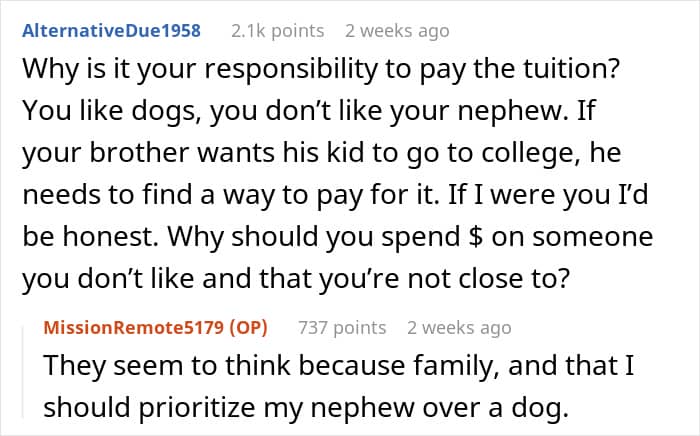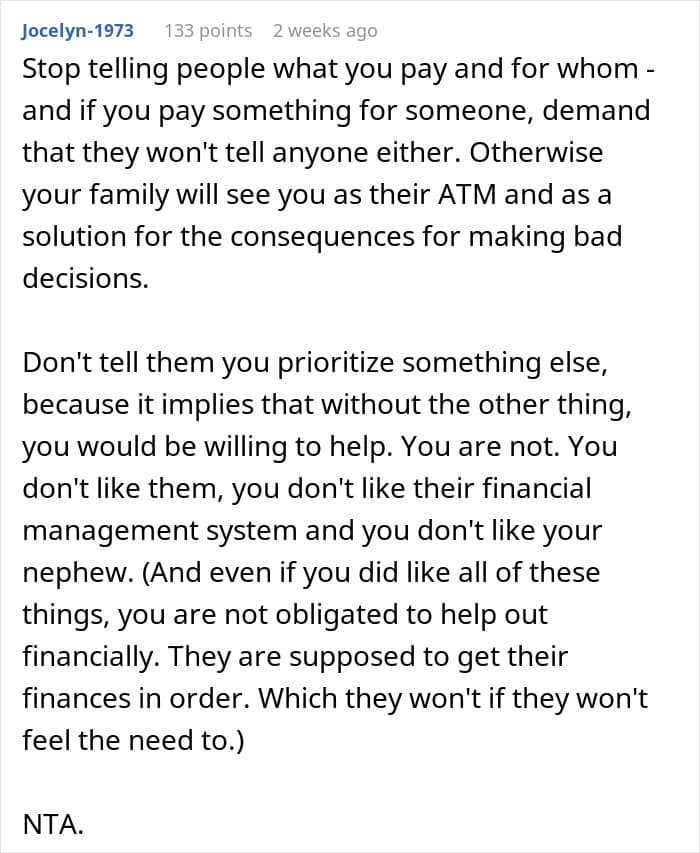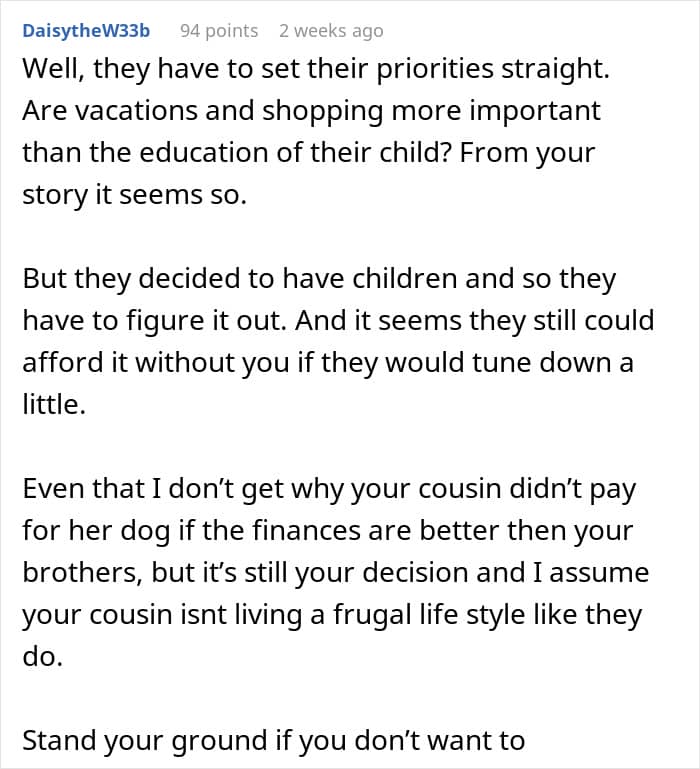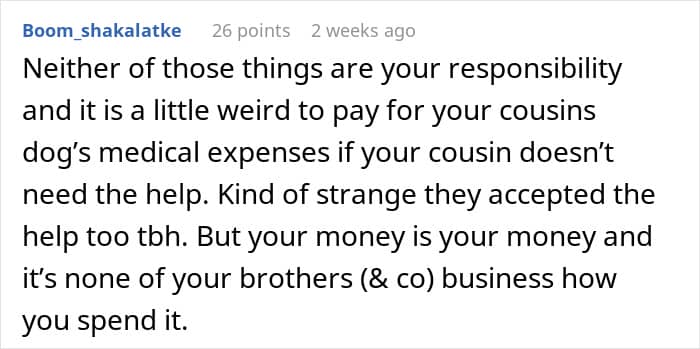You know the saying, “Blood is thicker than water, but it isn’t thicker than credit card debt”? Okay, maybe that’s not actually a saying, but it sure should be. Because money and family are a messy mix—one minute you’re sharing laughs at the barbecue, the next, you’re dodging passive-aggressive remarks about your “selfish” spending habits.
If someone dares to choose what they do with their own cash, they’re labeled a traitor. Just like our Redditor was when she refused to cover her spoilt nephew’s college tuition, suggesting to her brother that designer bags and annual trips to the Maldives aren’t exactly essential expenses.
More info: Reddit
RELATED:When your generosity becomes expected, not appreciated, it’s time to close the wallet

One woman covered her cousin’s beloved dog’s medical bills but refused to pay for her nephew’s college tuition, as his parents can afford it

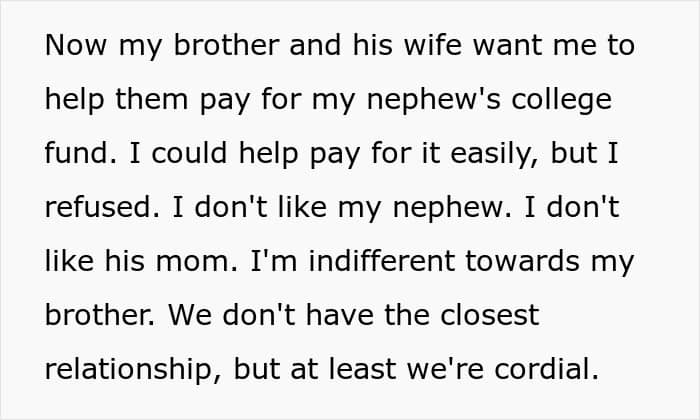

The woman’s brother and his wife live a lavish lifestyle. They always buy designer brands and go on multiple vacations a year, but demand the aunt pay for her nephew’s college


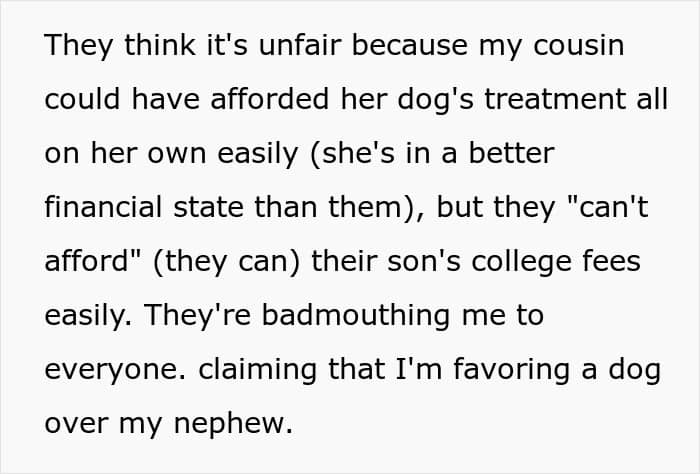

The woman is not close with her brother, and she doesn’t really like her nephew or his mother, so she doesn’t feel like she should pay for his education



The woman refuses to pay for her nephew’s tuition, telling her brother and his wife to give up a few designer bags and pay for it themselves
The OP (original poster) found herself in the middle of a family mess when she generously paid for her cousin’s dog’s medical treatment but refused to fund her nephew’s college tuition. The audacity, right? According to the OP’s brother and his wife, she basically committed an unforgivable crime by choosing to support a four-legged friend over their son’s higher education.
But see, the OP adores her cousin, loves her cousin’s dog, and had no problem footing the bill for the pup’s expensive medical treatment. But when her brother and his wife came knocking, demanding cash for their son’s tuition, the OP gave them a hard pass. Why? Because she doesn’t like her nephew. Or her sister-in-law. And she’s also pretty indifferent about her brother.
Plus, it’s not like they’re struggling; they just don’t want to cut back on their luxury vacations or shopping sprees. They could easily afford the tuition, but it would mean saying goodbye to a few designer bags and first-class flights to some exotic island.
So, instead of acknowledging that maybe they should rework their budget, the OP’s family decided to rally the troops and drag her name through the mud. They’ve been telling everyone she cares more about a dog than her own blood. And, well… they’re not exactly wrong. Besides, when your family acts that entitled, it’s easy to choose a pooch over a nephew. Just saying.

To find out more about entitlement, We reached out to Patrick Wanis, PhD, a behavior and relationship expert and the creator of SRTT Therapy (Subconscious Rapid Transformation Technique), for some comments. He told us that people with an entitled mentality expect special treatment without putting in effort or reciprocating kindness.
“The signs [of an entitled individual] are easy to spot: They lack gratitude, expecting others to cater to their needs while rarely acknowledging generosity. They struggle with boundaries, reacting negatively to being told, ‘No.’ They want rewards without work and take from relationships without giving back,” Dr. Wanis explains.
We asked Dr. Wanis how entitlement develops. He told us that entitlement is primarily a learned behavior, though certain personality traits may make someone more susceptible to it. When children are overindulged—given everything they want and shielded from consequences—they internalize the idea that others exist to serve their needs.
“Privilege, social conditioning, and cultural influences (such as social media glorifying success without effort) reinforce entitlement. It can also stem from neglect or trauma, where entitlement becomes a defense mechanism to regain control or compensate for past deprivation,” Wanis explains.
We wanted to know why entitled people often use guilt-tripping when they don’t get their way. Wanis suggests that this tactic is particularly effective on those who are empathetic or conflict-averse, as they are more likely to give in to avoid feeling guilty. By portraying themselves as victims, entitled individuals elicit sympathy and exert emotional control, making it harder for others to uphold their boundaries.
We asked Dr. Wanis how someone should handle a situation where their family enables an entitled person’s behavior. He told us that the best approach is to refuse to participate in enabling behavior. Setting firm boundaries with both the entitled individual and their enablers is essential.
If family members fail to recognize the issue, calmly pointing out patterns—such as how constantly giving in reinforces unrealistic expectations—may help. Arguing directly with the entitled person is often ineffective, as they tend to manipulate family dynamics to their advantage. In some cases, distancing oneself from the situation may be necessary to maintain personal well-being.
As for the OP, if choosing to help a sick pup over funding a lifestyle of luxury vacations makes her the villain, well, then she can wear that title proudly—preferably while cuddling up with a very grateful pooch.
What do you think of this story? Should the poster have helped out her nephew, or was she right to draw the line? Share your thoughts in the comments below! I’m all ears.
Netizens side with the woman, saying what she does with her money is her business and she doesn’t owe her brother’s family anything
